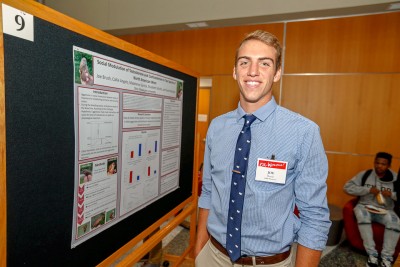Abstract
Social Modulation of Testosterone and Corticosterone in Two Species of North American Wren
 Student: Joe Brush
Student: Joe Brush
Faculty Mentors: Dustin Reichard (OWU Department of Zoology) and Elizabeth Schultz (OWU Department of Zoology)
Aggressive behavior resulting from social interactions causes specific changes in the levels of circulating hormones in animals. This summer we worked to further define the relationship between aggressive behavior and testosterone and corticosterone levels in males of two North American songbird species. By playing recordings of rival males, we elicited a territorial response from each bird, recorded their behavior, then caught them and collected a blood sample. We found that these species respond differently to the simulated intruder, and the blood will be analyzed later to determine the relationship between aggression and these hormones.
In songbirds, aggressive behavior plays an important role in the social interactions between members of a population. These behaviors are necessary for establishing territories and securing mates. Circulating hormones such as testosterone regulate these behaviors throughout the reproductive cycle, rising during the breeding season. Other hormones are also associated with aggressive behavior and stress but do not fluctuate seasonally, such as corticosterone. The “Challenge Hypothesis” postulates that during specific social interactions, levels of these hormones rise to their physiological limits. To further investigate the relationship between these specific hormones and aggressive behavior, we studied male house (Troglodytes aedon) and Carolina (Thryothorus ludovicianus) wrens. We conducted simulated territorial intrusions (STIs) using the playback of a conspecific male within the territory of an established wren, provoking a behavioral response that was quantified. We then caught the bird and took a blood sample within three minutes. A preliminary behavioral analysis suggests that house wrens sing more and are more active in response to an intruder. The plasma will be analyzed using hormone assays to determine the level of circulating hormone in each bird.
